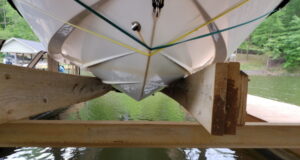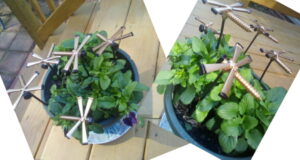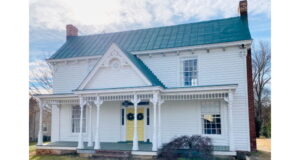By Frank Stollman - Traditional Southern Construction

Living on the lake creates lasting family memories both on the water and the land. The bridge between the land and water is your dock. Like houses, docks require annual maintenance that if neglected can lead to catastrophic results. Taking time at the beginning and end of the season will ensure that your dock is safe and lasts a lifetime.
Docks are made primarily of wood and can deteriorate due to exposure and wear. We have broken down your dock into different categories and will address the signs of wear and how to repair areas of concern.
Pilings
 Your dock structure is constructed from wood pilings that are embedded in the lake floor. Like all natural materials, your pilings need to be inspected each year for wear and structural integrity. Treated wood is chemically injected under pressure with preservatives that extend the life of the wood while being submerged in water. Each piece of wood absorbs the treatment and weathers differently, so each timber should be inspected annually. Many older docks have pilings that have shrunk in diameter or show signs of erosion from waves. These pilings need to be replaced since size changes will affect the structural strength of the material.
Your dock structure is constructed from wood pilings that are embedded in the lake floor. Like all natural materials, your pilings need to be inspected each year for wear and structural integrity. Treated wood is chemically injected under pressure with preservatives that extend the life of the wood while being submerged in water. Each piece of wood absorbs the treatment and weathers differently, so each timber should be inspected annually. Many older docks have pilings that have shrunk in diameter or show signs of erosion from waves. These pilings need to be replaced since size changes will affect the structural strength of the material.
Walkways & Decking
 Being exposed to the harsh sun, rain, and snow will take a toll on your dock. Whether your dock has wood decking or a manufactured product, a close inspection for failures is important.
Being exposed to the harsh sun, rain, and snow will take a toll on your dock. Whether your dock has wood decking or a manufactured product, a close inspection for failures is important.
Wood decking can show signs of cracking and splitting as the wood expands and contracts with the temperatures of the seasons. Many boards will begin to cup, which is the curling up of the wood at the edges or bowing of the planks. These boards are unsightly, can be hazardous with splinters or nails popping, and allow water to penetrate the wood. Boards that are cupping should be replaced, and a new stain or paint applied to the surface. There are several products on the market that are thicker than stains or paint which fill the voids caused by cracking or knots deteriorating in the wood.
A good power washing with an environmentally-friendly cleaner will remove dirt, mildew, and old paint or stain. Exposing the raw wood will allow the new stain or paint to better adhere to the wood. It will also help blend the new boards with existing and keep the deck looking uniform.
When examining your decking, don’t forget to look up! Often the decking is showing wear, but the cause is from above. Unlike your house, docks are typically not fitted with gutters because the rain runs off the roof and into the lake. Not having gutters creates a curtain of water as it runs off the roof onto your deck. Roof run can cause severe water damage. Dock owners should consider adding gutters to their roofs. Eliminating runoff and routing it to the ends of the dock will make your decking and the paint or stain last longer.
Man-made decking products will last longer than wood but require a different type of maintenance. These products should never be washed with a pressurized spray. Pressure washing can cause damage to the product by creating a rough texture or grooves in the surface which will hold water, create points of mildew and be unsightly. Washing with an environmentally safe detergent, a soft brush and hose will clean the boards and bring back the original look. Man-made products should not split or cup like wood, but the screws that fasten them to the dock structure can back out or pull through the board. Any screws that show signs of compromise should be replaced.
If you are considering replacing your wood decking with a man-made product, it is important to note that you may need to add additional framing. Wood decking can be set on joists 16 inches on center, while a manufactured product should be set 12 inches on center. The manufactured products are less rigid than wood and require closer spacing to prevent “soft spots” and bending of the boards between joists.
Roof
 Like your house roof, this part of the dock takes a pounding from the sun and wind but provides shade for your guests and the protection of your toys. Roofs can be shingled or metal, and both need to be inspected each year. High winds can lift or break shingles and these need to be replaced to keep the roof watertight and cosmetically appealing. Metal roofs are screwed to the wood structure and have washers that seal the screw to the metal. These washers can deteriorate and become brittle and break. Once the washer is compromised, it becomes a location for water penetration. Screws can also “back out” from the wood and not keep the metal securely fastened. A close examination of the screws will reveal these issues, and each should be replaced.
Like your house roof, this part of the dock takes a pounding from the sun and wind but provides shade for your guests and the protection of your toys. Roofs can be shingled or metal, and both need to be inspected each year. High winds can lift or break shingles and these need to be replaced to keep the roof watertight and cosmetically appealing. Metal roofs are screwed to the wood structure and have washers that seal the screw to the metal. These washers can deteriorate and become brittle and break. Once the washer is compromised, it becomes a location for water penetration. Screws can also “back out” from the wood and not keep the metal securely fastened. A close examination of the screws will reveal these issues, and each should be replaced.
Wave Boards
When you look at your dock, you will see that the sides are faced with three rows of boards with spacing between them. These are aesthetically pleasing but also perform a vital role in the health of your dock. These boards are designed to break the waves on the lake from coming in direct contact with the pilings and the gaps allow water to pass under the dock. These boards can take a beating from boat wakes and need to be maintained like the pilings. Any of these boards that have fallen, broken, or are missing should be replaced.
Bumpers
 Boat bumpers come in all shapes and sizes. They are a soft material that creates a gap between the boat and the dock and absorbs shock, reducing potential damage to the structure, deck, and wave boards. Their importance is twofold: preventing damage to boats and jet skis as well as the dock.
Boat bumpers come in all shapes and sizes. They are a soft material that creates a gap between the boat and the dock and absorbs shock, reducing potential damage to the structure, deck, and wave boards. Their importance is twofold: preventing damage to boats and jet skis as well as the dock.
How often have you seen a jet ski bang into the side of a dock? Placing your bumpers in areas where there is a potential for damage is key. Cylinder bumpers can be placed along the exterior of a dock and extend down the side protecting the structure and wave boards. Horizontal bumpers can be located on the corners and sides of the slips, protecting the dock from boats as they enter the slip. These can be located at two levels to provide protection as the lake level fluctuates. Strip bumpers can be attached to the deck edge and offer protection against watercraft that are tied to the dock.
Ladders
The lake wouldn’t be as much fun without being able to get in and out of the water with ease. Docks should have a ladder installed as a measure of safety and convenience. Ladders come in all styles and lengths. Ladders can be permanently affixed to the dock or be raised and lowered as needed. When choosing a ladder, consider which style works best for you. Ladders extending into the water will become covered in algae and can be slippery. Cleaning the ladder rungs on a regular basis will keep the ladder safe.
All these maintenance tips can be performed by a licensed contractor or a handy homeowner. Maintaining your dock will keep it structurally sound, extend its life and offer friends and family a safe place to create memories of a lifetime.
Licensed Home & Dock Builder
Serving the Hyco Lake Area
(919) 270-4394
 Happy Endings Publications Hyco Lake, River City Area & SoBo Halifax Magazines
Happy Endings Publications Hyco Lake, River City Area & SoBo Halifax Magazines










